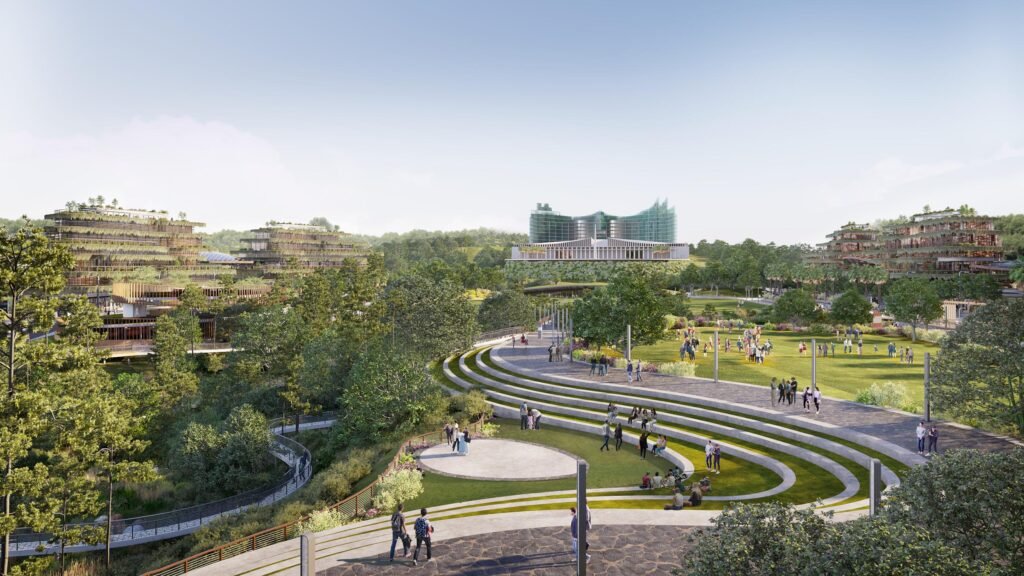Indonesia’s construction industry is on the verge of a significant transformation, largely driven by the adoption of cutting-edge technologies. With the development of the country’s new capital city, Nusantara (Ibu Kota Nusantara – IKN), it’s no wonder we’re seeing a rise in Construction Technology Adoption in Indonesia. Technological advancements such as drones, Artificial Intelligence (AI), and 3D printing are at the forefront of reshaping how infrastructure projects are approached. These innovations promise not only to increase efficiency but also to reduce project costs, making Indonesia a key player in the smart city revolution.
Nusantara: The Role of Construction Technology Adoption in Indonesia

Set to be inaugurated in August 2024, Nusantara aims to become a hub of sustainability and resilience. The government envisions this new capital as a smart city that addresses urban challenges through modern technology. Construction Technology Adoption in Indonesia will include AI, the Internet of Things (IoT), and Big Data. They are all expected to form the backbone of Nusantara’s operational systems, enabling a more sustainable approach to city management.
By integrating digital solutions, the city will offer intelligent transportation systems, such as autonomous and electric vehicles, to reduce congestion and carbon emissions. Furthermore, the use of smart technology will enhance resource management in areas such as energy, water, and waste disposal. At the end, it will contribute to the overall sustainability goals of the city.
Innovations Shaping the Industry: Drones, AI, and 3D Printing
In the broader construction sector, several Construction Technology Adoption in Indonesia are driving change. One of the most impactful is Building Information Modeling (BIM), which allows for the creation of detailed 3D models that serve as digital representations of projects. This fosters better collaboration among teams and minimizes errors during the construction process. BIM has already been applied in various Indonesian projects, including the renovation of major sports venues for the upcoming FIFA U-20 World Cup.
Drones have also become a valuable tool in construction, used for surveying land and inspecting sites. By providing real-time aerial views, drones reduce the time and costs associated with manual inspections. These unmanned vehicles are particularly useful for large-scale projects like the construction of Nusantara, where covering vast areas quickly is crucial.
Artificial Intelligence (AI) is making strides in construction project management by predicting potential delays, cost overruns, and safety risks. Construction Technology Adoption in Indonesia using AI-powered tools can analyze large datasets to help managers optimize resource allocation, reducing the risk of costly errors.
3D printing is another game-changer, especially in prefabrication. This Construction Technology Adoption in Indonesia allows for the efficient production of building components, reducing both material waste and labor costs. In a country like Indonesia, where there is a high demand for affordable housing, 3D printing can play a pivotal role in addressing these needs by speeding up construction times and lowering expenses.
Economic and Environmental Benefits
The Construction Technology Adoption in Indonesia offers substantial benefits beyond just cost savings. For instance, the use of drones and AI reduces the need for human intervention in high-risk tasks, improving worker safety on construction sites. Additionally, digital technologies like BIM and IoT enable more sustainable construction practices by optimizing resource use and minimizing waste.
In terms of environmental impact, technologies such as AI can assist in planning more energy-efficient buildings, which aligns with Indonesia’s broader goals of reducing carbon emissions. The integration of renewable energy sources into construction projects is another area where technological advancements are making a significant impact.
The Future of Construction in Indonesia
The path forward for Indonesia’s construction industry is clear: embracing digital technologies is essential for the country to achieve its ambitious development goals. With projects like Nusantara setting the stage, the integration of drones, AI, 3D printing, and other advanced tools will continue to shape the future of construction in Indonesia, leading to more efficient, cost-effective, and sustainable outcomes.
As Indonesia prepares to inaugurate its new capital, the Construction Technology Adoption in Indonesia offers a glimpse into the future—one where smart cities are the norm and sustainability is built into every project. By harnessing the power of these innovations, Indonesia can not only meet its infrastructure needs but also set an example for other developing nations.

